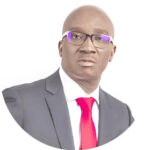I read with interest the editorial of Daily Trust of September 14, 2021, on the recent coup in Guinea.
The ouster of President Alpha Conde, 83 years, overthrown in a coup d’etat by officers of the elite Army Special Forces unit led by Colonel Mamady Doumbouya, was greeted with celebrations on the streets.
Surprisingly, the coup was quickly endorsed by the opposition leader, Cellou Dalein Diallo. The citizens too were seen jubilating and chanting ‘freedom’ as the Guinea junta drove Conde round Conakry, the nation’s capital, demonstrating his rejection by Guineans.
As observed by Daily Trust, Colonel Doumbouya made series of pronouncements, invoking the failure of the ousted elite to promote the welfare of the people and promising redemption. He pledged a “national union” government soon. He also dissolved the county’s elected government and suspended the nation’s constitution. He similarly gave an assurance of calm to the vital mining sector.
I quite agree with the editorial that the United Nations (UN), African Union (AU), ECOWAS and their member nations should be more forceful in condemning anti-democratic tendencies of leaders and not hide under the cover of non-interference in countries’ internal affairs.
However, it is sad to realise that those regional and international bodies only come out to condemn such unconstitutional overthrows of government but would not condemn the same governments for unethical practices and the breaches of the Constitution.
Just as the editorial noted, in the run-up to the third term election in Guinea, their condemnation was at best feeble. I strongly agree that governments and other regional bodies should withdraw support for any leader working to subvert democracy.
Democracy is a rule by the constitution and reign of civil laws, which are reasonably justifiable in a democratic society with civilians exercising all legislative, executive and judicial powers. Military rule on the other hand means the suspension of the constitution and imposition of martial law with the military exercising all legislative, executive and sometimes judicial powers as the case may be.
While I agree that democratic government is better than military rule, the elected representatives should strive at protecting the interest of citizens through popular participation and constructive engagements.
My question is: What could be the alternative in a state where the elected representatives and other figures in a democratic government failed their statutory responsibilities in addressing the yearning of their people?
Should they wait endlessly for the end of a long tenure for another election that could be rigged or changed the constitution for perpetuity in office?
Khadijat Abdulmalik wrote from Wuse Zone 5, Abuja
 Join Daily Trust WhatsApp Community For Quick Access To News and Happenings Around You.
Join Daily Trust WhatsApp Community For Quick Access To News and Happenings Around You.


